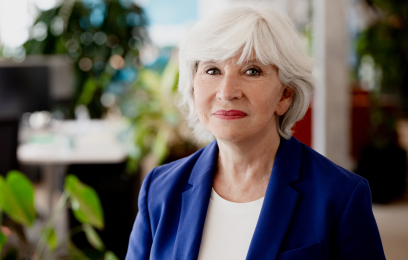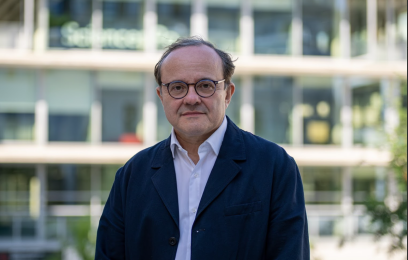McCourt Institute Announces Recipients of 2022 Research Grants to Advance Ethical Technology and Digital Governance
Through McCourt Institute funding, Sciences Po and Georgetown University will award grants to 28 researchers to support 17 projects focused on reimagining ethics, policy and governance for the digital age
PARIS and WASHINGTON – The McCourt Institute, which was established to advance technology for the common good with founding partners Sciences Po in Paris and Georgetown University in Washington, D.C., today announced the 2022 recipients of research grants to advance ethical technology and digital governance. The awardees and their projects were announced during the McCourt Institute’s inaugural event today in Paris.
“The McCourt Institute is thrilled to work with two world-class academic communities to better understand the problems that current technologies have caused and exacerbated and, more importantly, move us closer to the solutions we need,” said Shéhérazade Semsar-de Boisséson, Inaugural Executive Director of the McCourt Institute.
The McCourt Institute has pledged to provide $50 million over 10 years to Sciences Po and Georgetown University to support the development of new scientific work and advance research on technology for the common good. Beginning with the 2022 recipients, funded projects will be selected annually and administered directly by Georgetown University and Sciences Po.
“There is almost no civic challenge–or solution–in which technology does not play a role,” said Maria Cancian, Dean of the McCourt School of Public Policy at Georgetown University. “Georgetown is committed to shaping ethical, equitable, and inclusive technologies that advance the common good. Our collaboration with Sciences Po and the McCourt Institute will help build on strengths in law, computer science, public policy, and ethics to tackle pressing issues at the intersection of technology and civil society.”
“The selected projects address important questions about the impact of digital technologies on the public and private spheres,” said Guillaume Plantin, Dean of Research and Faculty at Sciences Po. “This support from the McCourt Institute will enable Sciences Po’s research teams to reinforce, and even extend, their work on essential topics such as the implementation of fact-checking mechanisms based on empirical evidence in order to fight against disinformation in online political debates, or the development of a robust legal framework adapted to the use of artificial intelligence for commercial or political purposes. Researchers will put these issues into perspective as they consider a more responsible, equitable and democratic digital governance.”
A steering committee representing Georgetown University faculty, Sciences Po faculty, and the McCourt Institute selected 17 projects, to be conducted by 28 researchers from Georgetown’s and Sciences Po’s academic communities. The projects will focus on the impact of technology on individuals and society and explore new governance models, regulatory frameworks and technologies to mitigate harm and advance the common good. Detailed descriptions of each grant project can be found here.
As these research projects are finalized, the McCourt Institute will work with Georgetown University and Sciences Po and the grantees to make their findings available to the public in a variety of formats.
For interview opportunities with the McCourt Institute or any of the researchers, please reach out to Ana Ramic at ana.ramic@mccourt.com.
END
###
ABOUT
The McCourt Institute
Established in 2021 with founding partners Sciences Po in Paris and Georgetown University in Washington, D.C., the McCourt Institute aims to ensure that digital governance is prioritized in the development of new technology and embedded in the next generation of the web. It supports the goals of Project Liberty, a visionary initiative launched by civic entrepreneur, business leader, and impact investor Frank McCourt to transform how the internet works, create a more equitable digital economy, and develop a new civic architecture for the digital world.
MEDIA CONTACT
Ana Ramic, McCourt Institute: ana.ramic@mccourt.com

01.07.2025
SCIENCES PO CRÉE LA PARIS CLIMATE SCHOOL,
LUIS VASSY NOMME LAURENCE TUBIANA COMME DOYENNE
Paris, le 01 juillet 2025 - Projet fort du directeur de Sciences Po Luis Vassy, la Paris Climate School est la première école européenne en sciences humaines et sociales visant à former des décideurs pour mener la transformation écologique, gérer les risques climatiques et renforcer la résilience de nos sociétés.
La Paris Climate School est la huitième école diplômante à Sciences Po. Elle accueillera dès la rentrée 2026 une cohorte d'une centaine d'étudiants dans un master, d'une durée de 2 ans et dispensé en anglais, intitulé « Ecological transition, risks and governance ».
Elle sera dirigée par Laurence Tubiana, dont l'expérience unique, à l'interface de la science, de la diplomatie climatique et de l'action publique, incarne l'ambition de cette école : former une nouvelle génération de décideurs capables de répondre à l'urgence écologique.
Diplomate et économiste, Laurence Tubiana est présidente de la Fondation européenne pour le climat (ECF) depuis 2017 et envoyée spéciale pour l'Europe pour la COP30. De janvier à juin 2025, elle a co-présidé le comité de préfiguration de la Paris Climate School avec Sophie Dubuisson-Quellier, directrice de recherche au CNRS et directrice du Centre de sociologie des organisations (CSO) de Sciences Po. Elle a été ambassadrice chargée des négociations lors de la COP21 et a co-présidé la Convention citoyenne pour le climat en 2020.
Sophie Dubuisson-Quellier dirigera le Comité Scientifique, composé des membres de la faculté permanente et des enseignants qui interviendront dans l'école.
Luis Vassy, directeur de Sciences Po : “Face à la gravité de la crise écologique et à son caractère existentiel, nous avons la responsabilité d'agir. Avec le lancement de la Paris Climate School, toute première école du climat en Europe, nous allons former à Sciences Po une nouvelle génération de décideurs outillés intellectuellement pour penser les bouleversements en cours et conduire les transformations systémiques. Cette école formera des professionnels du privé comme du public pour financer la transition, la planifier, et gérer les risques climatiques. Je me réjouis que Laurence Tubiana ait accepté de devenir la doyenne de la Paris Climate School. Son expérience unique, à l'interface de l'économie, de la diplomatie climatique et de l'action publique, incarne l'ambition de cette école. C'est une grande fierté pour Sciences Po.”
Laurence Tubiana, doyenne de la Paris Climate School : “Je suis très fière et très enthousiaste de devenir la doyenne de la Paris Climate School. Cette création intervient à un moment décisif pour le futur de notre planète et de nos sociétés. Face à l'urgence écologique, il est indispensable de former des jeunes capables de penser et d'agir autrement. Sur le climat, Sciences Po peut devenir un acteur de rang mondial, en alliant excellence académique, interdisciplinarité et engagement.”
Pour en apprendre davantage sur la Paris Climate School.
Lire plus

